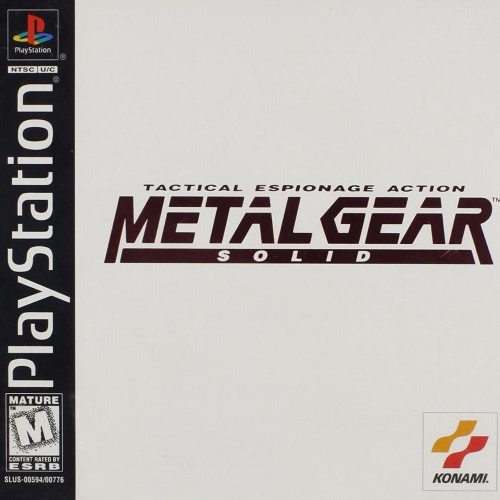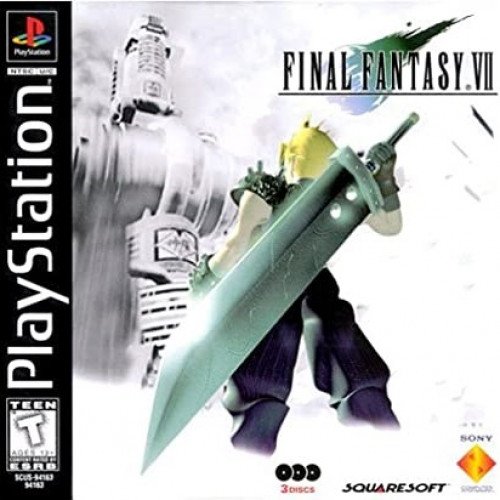The best PS1 games of all time

Metal Gear Solid
Metal Gear Solid[a] is a stealth game developed by Konami and released for the PlayStation in 1998. It was directed, produced, and written by Hideo Kojima, and follows the MSX2 video games Metal Gear and Metal Gear 2: Solid Snake, which Kojima also worked on.[5] It was unveiled in the Tokyo Game Show in 1996 and shown in the Electronic Entertainment Expo in 1997.[6] Players control Solid Snake, a soldier who infiltrates a nuclear weapons facility to neutralize the terrorist threat from FOXHOUND, a renegade special forces unit.[7] Snake must liberate hostages and stop the terrorists from launching a nuclear strike.[8] Cinematic cutscenes were rendered using the in-game engine and graphics, and voice acting is used throughout.[9] Metal Gear Solid sold more than seven million copies worldwide[10] and shipped 12 million demos.[11] It scored an average of 94/100 on the aggregate website Metacritic.[12] As of 2012, it was commonly regarded as one of the top 10 and most important video games of all time[13][14] and is ranked 96th best game on Metacritic by average publication score as of 2021. Metal Gear Solid helped popularize the stealth genre and in-engine cinematic cutscenes. It was followed by an expanded version for PlayStation and Windows, Metal Gear Solid: Integral (1999), and a GameCube remake, Metal Gear Solid: The Twin Snakes (2004).[15][16] It produced numerous sequels, starting with Metal Gear Solid 2: Sons of Liberty (2001), and media adaptations including a radio drama, comics, and novels.
Statistics for this Xoptio

Final Fantasy VII
Final Fantasy VII[b] is a 1997 role-playing video game developed by Square for the PlayStation console. It is the seventh main installment in the Final Fantasy series. Published in Japan by Square, it was released in other regions by Sony Computer Entertainment and is the first in the main series with a PAL release. The game's story follows Cloud Strife, a mercenary who joins an eco-terrorist organization to stop a world-controlling megacorporation from using the planet's life essence as an energy source. Events send Cloud and his allies in pursuit of Sephiroth, a former member of the corporation who seeks to harm the planet. During the journey, Cloud builds close friendships with his party members, including Aerith Gainsborough, who holds the secret to saving their world. Development began in 1994, originally for the Super Famicom. After delays and technical difficulties from experimenting on several real-time rendering platforms, Square moved production to pre-rendered video, necessitating the huge capacity of the CD-ROM format and therefore departing Nintendo for the PlayStation. Veteran Final Fantasy staff returned, including series creator and producer Hironobu Sakaguchi, director Yoshinori Kitase, and composer Nobuo Uematsu. The game is the first in the series to use full motion video and 3D computer graphics, superimposing 3D character models over 2D pre-rendered backgrounds. Final Fantasy VII introduced more widespread science fiction elements and a more realistic presentation, while the gameplay systems remained largely similar to previous entries, with the addition of new elements such as Materia, Limit Breaks, and new minigames. The staff of more than 100 had a combined development and marketing budget of around $80 million. Assisted by a large promotional campaign, Final Fantasy VII received commercial and critical success, selling over 12.8 million units worldwide. It remains widely regarded as a landmark game, and as one of the most influential and greatest video games ever made. It won numerous Game of the Year awards, and was acknowledged for boosting sales of the PlayStation and popularizing console role-playing games worldwide. Critics praised its graphics, gameplay, music, and story, but criticized its original English localization. Its success has led to enhanced ports on various platforms, a multimedia sub-series called the Compilation of Final Fantasy VII, and the ongoing multipart high-definition Final Fantasy VII Remake, the first installment of which was released in 2020.